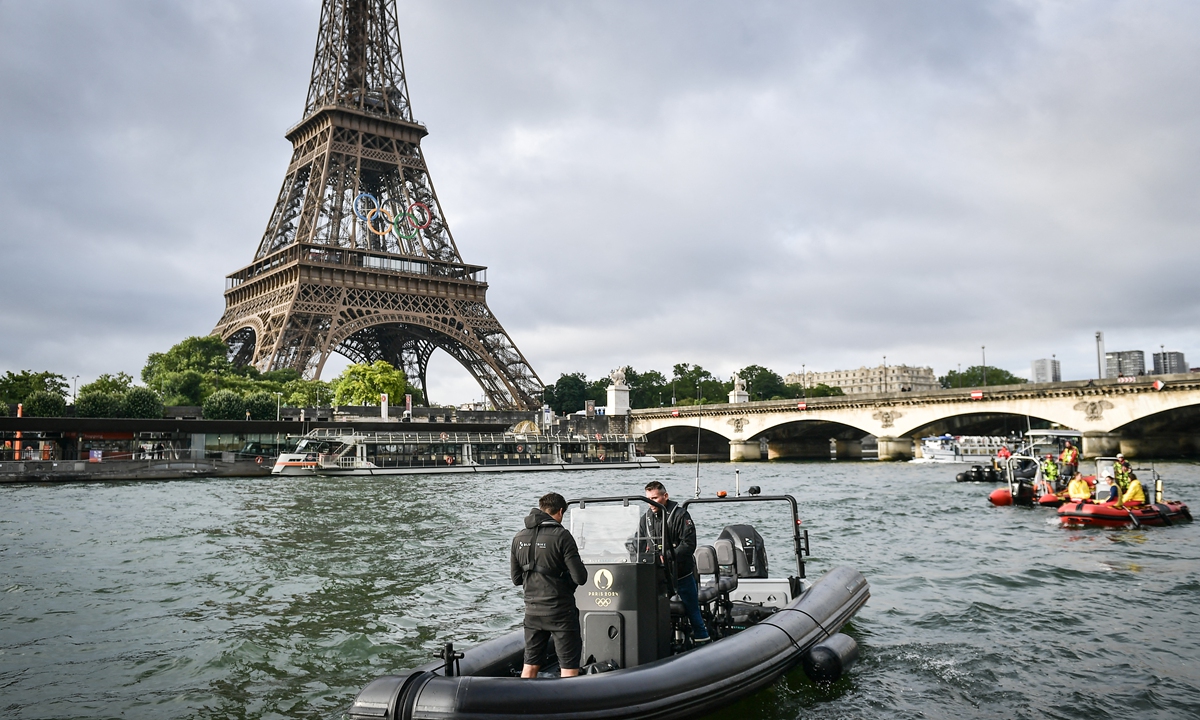
Organizers units take part in a fleet technical test of the athletes' parade, pass on the river scene for the opening ceremony of the Paris 2024 Olympic and Paralympic Games, in Paris on June 17, 2024. Photo: VCG
The Chinese swim team has faced unprecedented levels of anti-doping scrutiny, undergoing nearly 200 tests administered by the International Testing Agency (ITA) since arriving in France, according to Yu Liang, the national swim team nutritionist.
This intensive testing regime has sparked concerns about the impact on athletes' rest and preparation for the upcoming Paris Olympics. Yu highlighted the disruption caused by the frequent tests.
"We've been in France for 10 days now, and during these 10 days, our 31 athletes have not only been training and adjusting to the time difference but have also been subjected to nearly 200 doping tests by the ITA, averaging almost 20 tests per day," Yu said in a social media post on Sina Weibo.
The Chinese national swim team is now training in Deauville before moving to Paris.
"Each athlete has been tested 5-7 times on average. The tests come early in the morning before we're even awake, during midday rest periods, forcing us to rest on hotel lobby sofas, and even late at night, keeping us up past midnight."
Yu's Sina Weibo post was later deleted for unspecified reasons, but it has already been widely circulated on social media.
An unnamed official within the ITA acknowledged the high frequency of testing but insisted it was part of the mandated plan.
"The number of tests is indeed excessive, but we can't do anything about it - it's all part of the plan given to us from above," the unnamed official said as quoted by Yu.
"I can't imagine the cooperation level you and the Chinese athletes have shown. If it were another team, they would have been complaining loudly and filing complaints all over the place by now."
The increased scrutiny of Chinese swimmers is set against a backdrop of ongoing tensions between the World Anti-Doping Agency (WADA) and the US.
Former senior International Olympic Committee member Dick Pound warned that the US' legal overreach, specifically through the Rodchenkov Act, could jeopardize the US' status as a future Olympic host. This Act, which extends US jurisdiction over international sporting events, is seen as non-compliant with WADA's anti-doping code.
Pound suggested that WADA might review US compliance, potentially affecting Los Angeles' hosting of the 2028 Summer Olympics and Salt Lake City's bid for the 2034 Winter Olympics.
"The Rodchenkov Act is problematic," Pound said in an interview with the Reuters news agency published on Wednesday.
"It's out of step with the international anti-doping code and could lead to the US being declared non-compliant."
Chinese swimmers have been subjected to far more tests than their US counterparts. Data from the Aquatics Integrity Unit shows that top Chinese swimmers like Zhang Yufei, Qin Haiyang, and Li Bingjie each underwent over 40 anti-doping tests in 2023. In contrast, leading US swimmers such as Lilly King, Caeleb Dressel, and Katie Ledecky were tested around 10 times.
The scrutiny intensified following positive tests for the banned substance trimetazidine (TMZ) by 23 Chinese swimmers during a 2021 domestic competition. Subsequent investigations attributed the results to contaminated food, a conclusion accepted by both WADA and World Aquatics.
Despite this, the ITA has mandated that Chinese athletes be tested at least eight times from January 1, 2024, to the start of the Paris Olympics, double the frequency of athletes from other countries.
Additionally, these tests are to be conducted by non-Chinese authorities, and samples analyzed outside of China to ensure impartiality, according to swimming's governing body World Aquatics.
The swimming events at the Paris Olympics are set to begin on July 27, a day after the opening ceremony.
Zeng Zirui contributed to the story.




